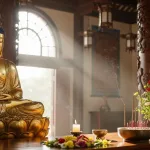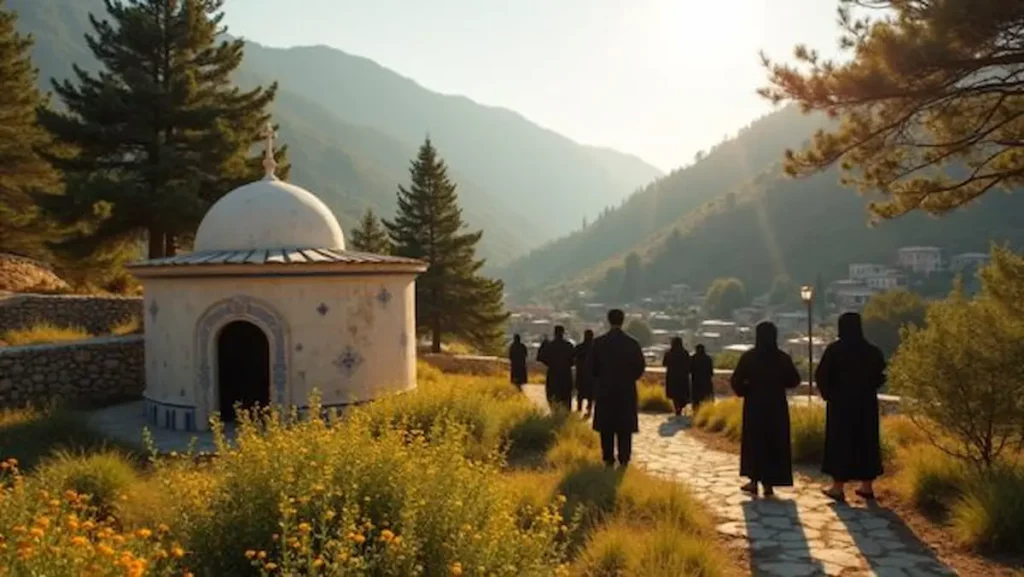The Druze religion is a distinctive faith, guided by beliefs in the oneness of God and the journey of the soul. Its teachings shape ethics, community life, and personal identity, while many sacred practices remain closely guarded within the community.
But how have the Druze maintained this delicate balance of devotion, secrecy, and adaptation across generations—and what can their traditions teach us about faith in the modern world?
Let’s explore.
Historical origins of the Druze faith
The Druze faith emerged in the early 11th century during the Fatimid Caliphate in the Middle East.
Guided by the teachings of Hamza ibn Ali and the reverence of Caliph al-Hakim, the Druze faith formed a distinct spiritual path that stood apart from other traditions.
Drawing on influences from Islam, Gnosticism, and Neoplatonism, the Druze faith developed a unique religious identity that continues to shape the community’s beliefs and practices today.
Core theological beliefs
Although influenced by various religious traditions, Druze theology centers on the concept of unity and the oneness of God, emphasizing an esoteric understanding of divine reality.
In Druze theology, cosmology explains the universe’s spiritual structure and the soul’s journey, while ethics guide followers toward truthfulness, loyalty, and social responsibility.
These core beliefs in Druze theology shape a distinct worldview that integrates spiritual knowledge with moral conduct, helping seekers connect faith, practice, and community.
The concept of Tawhid in druze belief
The concept of Tawhid in Druze belief centers on the absolute oneness of God. In this spiritual tradition, Tawhid means acknowledging that God is singular, indivisible, and beyond all human categories. This core idea shapes Druze spirituality and daily practice, guiding how believers view creation, moral responsibility, and the purpose of life.
For the Druze, the concept of Tawhid is not just a doctrine—it is a way of living. It rejects any division within the divine essence and calls for inner unity, sincerity, and truthfulness. By focusing on God’s oneness, followers seek harmony between intention and action, seeing all existence as interconnected and rooted in a single divine source.
Ultimately, the concept of Tawhid aligns faith with ethical living. It encourages reflection, compassion, and accountability, reminding the Druze that every choice reflects their understanding of divine unity. Through this lens, spirituality becomes a path of simplicity, integrity, and deep connection with the One.
The role of reincarnation
Reincarnation holds a significant place within Druze theology, shaping their understanding of the soul’s journey beyond a single lifetime.
In Druze spirituality, reincarnation underscores continuous spiritual growth across multiple lives, helping the soul evolve, correct past mistakes, and deepen moral awareness.
This cycle highlights the Druze view of life as an ongoing path of learning and purification, where each incarnation offers new chances for ethical refinement, inner wisdom, and closeness to the divine—making reincarnation a central pillar of their religious worldview.
The Druze view of God and prophets
The Druze view of God highlights a single, transcendent unity beyond human understanding. In the Druze view of God, the divine is indivisible, eternal, and not limited by form or image.
Prophets are seen symbolically as wise guides who reveal spiritual truth, rather than as literal intermediaries. This approach prioritizes inner knowledge, ethical living, and personal insight over ritual or dogma.
For seekers exploring the Druze view of God, the focus is on discovering divine wisdom within and honoring the oneness that connects all existence.
Sacred texts and writings
Understanding the Druze perspective on God and prophets naturally leads to an exploration of the Druze sacred texts that convey their spiritual teachings.
The Druze regard their sacred writings as expressions of divine revelation, offering philosophical and theological insights rooted in religion and spirituality.
These texts guide adherents in spiritual matters, emphasizing unity, truth, and ethical living, and are central to preserving the community’s religious identity and beliefs.
For readers interested in religion and spirituality, learning about Druze sacred texts provides a clear path to understanding how revelation, wisdom, and community values shape a living spiritual tradition.
The importance of secrecy and esotericism
In the Druze faith, secrecy and esotericism are key to preserving spiritual wisdom. Followers focus on inner knowledge and personal growth, with sacred teachings shared only with initiated members.
This approach protects the heart of the religion from misunderstanding and keeps its spiritual insights pure. By honoring secrecy and esotericism, the community maintains a deep connection to its traditions and ensures that religion remains a source of guidance and meaning.
For seekers interested in spirituality, understanding secrecy and esotericism in the Druze faith offers a respectful view of how sacred knowledge is protected and passed down.
Social structure and community organization
In the Druze faith, spirituality guides daily life, but social structure and community organization are what sustain identity and unity across generations.
The Druze maintain a clear community hierarchy that strengthens social cohesion, encouraging mutual support, shared responsibility, and collective decision-making.
This community organization preserves sacred traditions, protects cultural values, and reinforces communal bonds, helping the Druze thrive amid external influences.
Through this strong social structure, the Druze faith remains resilient, demonstrating how community organization can safeguard religious heritage and spiritual continuity.
Religious leadership and the role of Uqqal
Religious leadership within the Druze community centers on the Uqqal, a select group of initiated elders who guide spiritual life and safeguard sacred teachings.
In Druze religion and spirituality, the role of the Uqqal is essential: they provide moral guidance, teach core principles, and help members live according to spiritual values.
The Uqqal hierarchy defines clear roles and responsibilities, with senior members overseeing religious education, interpreting scripture, and preserving doctrine.
Through discreet leadership, the Uqqal maintain community cohesion and protect esoteric knowledge, ensuring that Druze spirituality remains authentic and relevant across generations.
This trusted structure keeps the faith strong, supports personal growth, and connects believers to the deeper wisdom of the tradition.
Key rituals and religious practices
The guidance provided by the Uqqal shapes key rituals and religious practices at the heart of Druze religion and spirituality.
Central to their religious life are Druze festivals and communal gatherings, which strengthen community bonds and spiritual devotion. These events emphasize prayer, meditation, and moral teachings, reflecting a deep commitment to religion, spirituality, and ethical living.
Through these practices, the Druze community nurtures unity, continuity, and a unique spiritual identity rooted in their religion and spirituality.
Dietary laws and lifestyle choices
In the Druze religion, spirituality and daily life are closely connected, and this link is clear in their dietary laws and lifestyle choices.
Druze cuisine reflects spiritual values like modesty, purity, and discipline. In the Druze religion, many people avoid pork and alcohol as part of their commitment to spiritual growth and ethical living.
These practices help build a strong community, encourage personal piety, and support a balanced, respectful way of life. By honoring these traditions, the Druze religion strengthens its identity and keeps spiritual values at the heart of everyday choices.
Marriage and family values
Although marriage customs vary among Druze communities, Druze marriage and family values consistently emphasize loyalty, respect, and the transmission of religious and cultural heritage.
In Druze marriage, the family hierarchy plays a central role in guiding behavior and decisions, shaping daily life through shared spiritual responsibilities.
Interfaith marriage is generally discouraged to preserve religious identity, reflecting the community’s commitment to maintaining cohesion and continuity within its social and spiritual framework.
These Druze marriage traditions highlight a deep connection between faith, family, and community.
The Druze stance on religious conversion
The Druze stance on religious conversion is clear and unwavering: the faith does not accept converts and does not encourage leaving the tradition.
In Druze spirituality, religious identity is considered innate and unchangeable, passed down through family and community. This approach to religious conversion helps preserve the integrity of their beliefs and practices, reinforcing a close-knit spiritual community that values continuity, ethical living, and ancestral wisdom.
Contemporary challenges and cultural preservation
As modern influences and globalization intensify, the Druze community faces real challenges in preserving its unique religious and spiritual identity.
The Druze faith must navigate assimilation pressures, digital culture, and limited external understanding, all of which can dilute spiritual practices and community bonds.
To support Druze spirituality and religious continuity, preservation efforts focus on safeguarding sacred teachings, maintaining the Arabic language used in ritual and study, and strengthening community cohesion through intergenerational learning.
Conclusion
The Druze religion is a monotheistic faith with deep spiritual roots, centered on the oneness of God, the soul’s journey, and the practice of reincarnation. In the Druze religion, ethical living, honesty, and loyalty to the community are essential values, guided by a spiritual elite known as the Uqqal, who preserve sacred teachings and offer wisdom. Core practices in the Druze religion include endogamous marriage customs, modest living, and specific dietary guidelines that reinforce identity and solidarity. Despite modern pressures, Druze communities remain resilient, protecting their traditions, fostering unity, and sustaining a strong cultural and spiritual heritage.
Amanda Torati is a linguist and postgraduate researcher dedicated to the study of interfaith dialogue and cultural expression. With an academic background in languages, she specializes in analyzing spiritual texts and universal values to bridge the gap between ancient traditions and modern reflection. At ABPray, Amanda combines her passion for research with a mindful approach, ensuring that every article promotes harmony, respect, and deep spiritual insight for seekers of all backgrounds.
Buddhism
When Buddhism faces its greatest dilemma: religion or philosophy? And why the answer changes inside a meditation hall
The question seems simple until you ask it to a Thai monk, a secular mindfulness teacher in Brooklyn, and a Tibetan scholar all in the same afternoon. None of them will agree. And this disagreement isn’t a problem of language or mistranslation, it’s the living scar of 2,500 years of Buddhism trying to fit into […]
Christianity
The abyss between worlds: why Mormonism and Catholicism represent irreconcilable metaphysics, not mere doctrinal disagreement
Discover the intriguing contrasts between Mormonism and Catholicism, but what hidden truths about salvation and the afterlife will you uncover?
Christianity
The question that breaks itself: why “are Jehovah’s Witnesses Christian?”Reveals something fractured at Christianity’s core
For those curious about the faith of Jehovah's Witnesses, their unique beliefs challenge traditional Christian definitions—what does this mean for their identity?
Buddhism
Beyond the textbook trinity: what really separates Theravada, Mahayana, and Vajrayana
Get to know the three main types of Buddhism, Theravada, Mahayana, and Vajrayana, and discover which path might resonate with your spiritual journey.
Buddhism
Buddhist non-theism is a lie: what I discovered when I stopped accepting the textbook explanation of what Buddhism actually is
Discover insights that could transform your spiritual journey.
Buddhism
I sat with a Hindu Priest and a Buddhist Monk for six hours. Here’s what they revealed about why their traditions can’t agree on anything, including reality Itself
It was 9 AM on a Saturday morning in a rented conference room in Boston, and within ninety seconds, these two practitioners had outlined a chasm so fundamental that I realized this conversation would not be about finding common ground. It would be about understanding why common ground is impossible, and more importantly, why each tradition contains internal contradictions so severe that they can barely agree with themselves.






